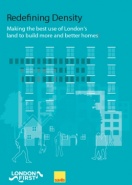Redefining density, making the best use of London’s land to build more and better homes
On 16 September 2015, London First and Savills published Redefining Density, Making the best use of London’s land to build more and better homes.
The report suggests that a new wave of housebuilding could be supported in London if City Hall and local authorities support a programme of housing densification.
It points out that London is not particularly densely developed compared to other major cities such as Paris and Madrid. Even one of London’s densest boroughs, Islington, with an average of 138 people per hectare, has a low density compared to Madrid’s Centro district, with an average of 286 people per hectare.
If low-density areas with good transport links had a moderately increased housing density, this could create approximately 1.4 million new homes across London. This is one million more than the 10-year London Plan housebuilding target, and if even just a tenth of these one million homes were built in the next 10 years, London could increase its housebuilding target to 52,000 new homes a year, close to the actual need for new homes.
The Greater London Authority suggests that London needs between 49,000 and 62,000 new homes every year. Savills estimates that an average of just 32,000 homes a year will be built under current plans over the next five years.
The report argues that higher density does not necessarily mean high-rise, and that tower blocks surrounded by empty space can have a lower density than Victorian terraced housing. It suggests that design quality is an important factor in persuading people that intensification of land use can work, and that higher density can create the critical mass required to support more shops, better local services, and improved social and transport infrastructure.
Jo Valentine, Chief Executive of London First said, “London is in the midst of a housing crisis and the business community believes housing costs are a major threat to the capital’s international competitiveness. We need London’s planning policies to give strategic support to building at a higher density, while being clear that the density of any particular development must be appropriate for its location.
Susan Emmett, Director, Residential Research, at Savills, said, “The opportunities to ensure that London is getting the most out of the development process are considerable, especially in the outer boroughs. Done properly, a higher density environment which combines a greater number of homes with shops, services and leisure space can bring many benefits to residents.”
[edit] Related articles on Designing Buildings Wiki
- Brownfield land.
- Compact living.
- Compact sustainable city.
- Could microhousing tackle London's housing crisis?
- Densification.
- Empty dwelling management orders.
- Garden suburb.
- Green belt.
- Huburb.
- Eco towns.
- Garden cities.
- High quality high density homes.
- London Plan.
- Masterplanning.
- Micro flats.
- New generation of town houses.
- Peter Barber - interview.
- Placemaking.
- Smart cities.
- Suburb.
Featured articles and news
The UK's Modern Industrial Strategy: A 10 year plan
Previous consultation criticism, current key elements and general support with some persisting reservations.
Building Safety Regulator reforms
New roles, new staff and a new fast track service pave the way for a single construction regulator.
Architectural Technologist CPDs and Communications
CIAT CPD… and how you can do it!
Cooling centres and cool spaces
Managing extreme heat in cities by directing the public to places for heat stress relief and water sources.
Winter gardens: A brief history and warm variations
Extending the season with glass in different forms and terms.
Restoring Great Yarmouth's Winter Gardens
Transforming one of the least sustainable constructions imaginable.
Construction Skills Mission Board launch sector drive
Newly formed government and industry collaboration set strategy for recruiting an additional 100,000 construction workers a year.
New Architects Code comes into effect in September 2025
ARB Architects Code of Conduct and Practice available with ongoing consultation regarding guidance.
Welsh Skills Body (Medr) launches ambitious plan
The new skills body brings together funding and regulation of tertiary education and research for the devolved nation.
Paul Gandy FCIOB announced as next CIOB President
Former Tilbury Douglas CEO takes helm.
UK Infrastructure: A 10 Year Strategy. In brief with reactions
With the National Infrastructure and Service Transformation Authority (NISTA).
Ebenezer Howard: inventor of the garden city. Book review.
The Grenfell Tower fire, eight years on
A time to pause and reflect as Dubai tower block fire reported just before anniversary.
Airtightness Topic Guide BSRIA TG 27/2025
Explaining the basics of airtightness, what it is, why it's important, when it's required and how it's carried out.
Construction contract awards hit lowest point of 2025
Plummeting for second consecutive month, intensifying concerns for housing and infrastructure goals.
Understanding Mental Health in the Built Environment 2025
Examining the state of mental health in construction, shedding light on levels of stress, anxiety and depression.






















